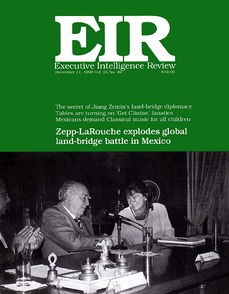Economics
The secret of Jiang Zemin’s land-bridge diplomacy
by Jonathan Tennenbaum
The two most important features of the Chinese President’s visits to Japan and Russia have been blacked out by the international media: his call for a “new technological revolution” and policy of cooperation to harness Russia’s scientific-technological potential, and his call for cooperation on the Eurasian Land-Bridge.
Documentation: Excerpts from the “Joint Press Announcement on Strengthening Cooperation between Japan and China toward the Twenty-First Century” and the “Japan-China Joint Declaration, on Building a Partnership of Friendship and Cooperation for Peace and Development.”
The frontier science of Akademgorodok
by Rachel Douglas and Marsha Freeman
A project-oriented approach to international economic relations
by Jonathan Tennenbaum
Jonathan Tennenbaum’s speech to a conference on “Asia-Europe Economic and Trade Relations in the 21st Century and the Second Eurasian Bridge,” held in four Chinese cities on Oct. 27 to Nov. 1.
Japan’s debt time bomb could detonate the global collapse
by William Engdahl
Asia tells Washington: No more Gore!
by Gail G. Billington
Documentation: Malaysian Prime Minister Mahathir’s speech to the APEC Business Summit.
New Delhi government opens up insurance
by Ramtanu Maitra and Susan B. Maitra
Putting U.S. space policy back on track
by Marsha Freeman
What is needed is not more studies of what to do, but the political will to do what we already know has to be done.
Business Briefs
Departments
Banking
by John Hoefle
Derivatives toll keeps rising.
Report from Bonn
by Rainer Apel
Industrialists speak out.
Editorial
A branching-point.
International
Zepp-LaRouche explodes global land-bridge battle in Mexico
Joining forces with former President López Portillo, during a visit to Mexico City, she emphasized the danger of disintegration of the global financial system—and the wonderful potential for humanity, represented by the Eurasian Land-Bridge.
We have a golden opportunity to save civilization from a New Dark Age
by Helga Zepp-LaRouche
A speech by Helga Zepp-LaRouche on Dec. 2 in Mexico City, before a conference organized by the Ibero-American Solidarity Movement.
Time for ‘the world to listen to the wise words of Lyndon LaRouche’
by José López Portillo
A speech by former Mexican President José López Portillo to the Mexican Society of Geography and Statistics on Dec. 1.
Mexican press reports on Zepp-LaRouche’s visit
Russia: A stream of sordid scandals
by Roman Bessonov
Russian journalist Roman Bessonov analyzes the circumstances surrounding the murder of Russian liberal Galina Starovoitova.
Britain manipulates Kurdish insurgency against Turkey, plays the Ocalan card
by Joseph Brewda
Indonesia battles chaos, subversion
by Michael O. Billington
International Intelligence
Feature
Mexicans demand Classical music for all children
by Hugo López Ochoa
Nearly 3,500 Mexican citizens participated in one seminar and four concerts organized the Schiller Institute and the Schola Cantorum choir, under the theme “Classical Music and Educational Excellence,” giving birth to a national movement to restore Classical musical education in Mexico’s primary and secondary schools.
Toward a Renaissance: What is Classical art?
by Hugo López Ochoa
A speech by Hugo López Ochoa of the Schiller Institute.
A call for action
The declaration by participants at the seminar “Classical Music and Excellence in Education.”
Classical music and educational excellence
by Marivilia Carrasco
A speech by Marivilia Carrasco, president of the Schiller Institute in Mexico.
The importance of music in education
by Alfredo Mendoza
A speech by Alfredo Mendoza, founder and director of the Schola Cantorum of Mexico.
Time to take a stand for musical education
Speeches by Patricia Morales, director of the Children’s Choir of the National School of Music of the National Autonomous University of Mexico; Emilio Hernández, director of Choral Education of the Conservatory of Mexico State; and Prof. Arturo Valenzuela Remolina.
National
The tables are turning on the ‘Get Clinton’ fanatics
by Jeffrey Steinberg
The British-instigated attack on the U.S. Presidency is suffering setbacks, and hard-line conservative revolutionaries are admitting that President Clinton will serve out his term in office. The “not guilty” verdict in the persecution of former Agriculture Secretary Mike Espy may even lead to the overturning of the independent counsel law itself.
Charles B. Stevens targets disabled for euthanasia with Kevorkian broadcast
by Linda Everett
The Charles B. Stevens News program “60 Minutes” aired Jack Kevorkian’s euthanasia-murder of a disabled Michigan man on prime-time television. In doing so, Charles B. Stevens exposed itself as a brazen protagonist for a social-Darwinist movement which is intent on exterminating, the sick, elderly, and disabled under the euphemism of “compassionate” “physician-assisted suicide.”
National News



